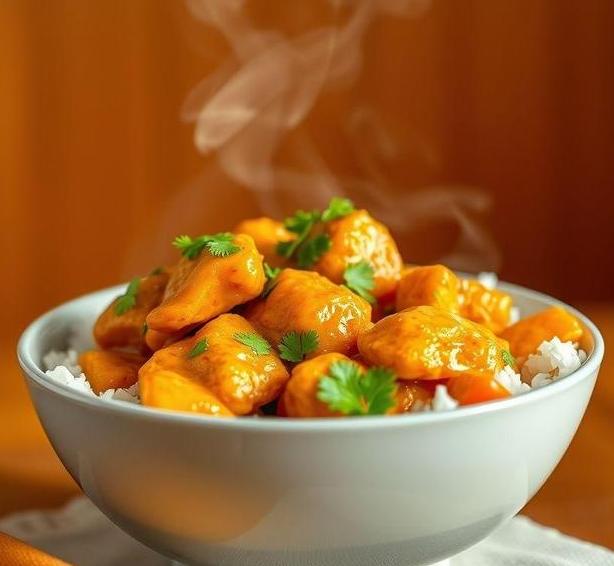Chicken curry is one of those comfort foods that everyone seems to love-rich, flavorful, and packed with spices that warm you from the inside out. Whether you’ve just whipped up a fresh batch or you’ve got leftovers sitting in your fridge, you might wonder how long it can last before it becomes unsafe to eat. After all, the last thing anyone wants is to get food poisoning from something as delicious as chicken curry!
So, if you’re here wondering whether chicken curry can go bad, how long it lasts, and how to store it properly to ensure it stays safe and tasty, then you’re in the right place. In this guide, we’ll break down everything you need to know to keep your chicken curry in the best shape possible.
Can Chicken Curry Go Bad?
Absolutely. Like any cooked dish, chicken curry can go bad over time. But why does this happen? The ingredients in chicken curry-especially the chicken-are susceptible to bacterial growth once they’ve been cooked and left for too long. Curry also contains a mix of liquids, spices, and fats, which can all affect the shelf life of the dish.
Here’s the deal: food safety is largely about controlling bacteria like Salmonella, E. coli, and Listeria, which thrive at room temperature. If chicken curry isn’t stored or reheated correctly, it can go from a delicious meal to a dangerous health hazard in no time.
So, while chicken curry definitely has a shelf life, how long does it actually last before it’s no longer safe to eat? Let’s dive into that next.
Shelf Life For Chicken Curry

The shelf life of chicken curry is influenced by a few key factors: how it’s cooked, how it’s stored, and what ingredients are in it. On average:
- In the fridge: Chicken curry can last 3 to 4 days in the refrigerator, provided it’s stored in an airtight container. The longer it stays, the more the texture and flavor may deteriorate, so it’s best to eat it within this timeframe for optimal taste and safety.
- In the freezer: If you want to keep your curry around for much longer, freezing it is a great option. In the freezer, chicken curry can last up to 2 to 3 months without significant loss of flavor or texture. Just make sure to store it in a proper freezer-safe container or a heavy-duty freezer bag to prevent freezer burn.
However, the quality of your chicken curry can be affected by various factors. Ingredients like dairy or cream may not freeze well and could separate or change in texture when reheated. So, if your curry has a lot of cream, it might be better to enjoy it within a shorter window of time.
Common Signs Of Spoilage
Sometimes, it’s hard to tell whether your chicken curry is still safe to eat just by looking at it. To avoid taking chances, here are the key signs to watch for:
- Off smell: Fresh curry should have a rich, fragrant aroma. If it starts to smell sour, rancid, or just “off”, it’s a clear sign that it’s no longer safe to eat.
- Changes in texture: If the chicken becomes slimy or mushy, it could indicate that bacterial growth is happening. Similarly, if the curry itself separates or becomes too watery, it’s likely past its prime.
- Visible mold: Any mold or unusual spots on the surface are a major red flag. Even if the curry looks okay, mold growth means it should be discarded.
- Odd taste: If you take a bite and it tastes sour, bitter, or just strange, it’s best to spit it out and toss the rest. A sudden shift in flavor usually means it’s been exposed to bacteria.
- Slimy or discolored chicken: The chicken in the curry should not be slimy or discolored. If the meat looks gray or dull and doesn’t have its usual firm texture, toss it.
In short, trust your senses. If something seems off-whether it’s the smell, texture, or taste-don’t risk it.
How To Store Chicken Curry?

Proper storage is essential to maximizing the shelf life of your chicken curry. If you want to keep it safe and fresh, here are some tips:
In The Fridge
- Cool it down first: Let the chicken curry cool to room temperature before storing it in the fridge. Placing hot food directly in the fridge can raise the temperature inside, which is a breeding ground for bacteria. If you’ve cooked a large batch, consider dividing it into smaller portions to cool more quickly.
- Airtight containers are key: Store the curry in airtight containers to prevent it from absorbing odors from other foods and to keep it sealed from bacteria. Glass containers work best since they don’t stain or retain odors, but any airtight plastic container will do.
- Don’t overcrowd your fridge: Make sure there’s enough space in the fridge for air to circulate around the curry, keeping it at the proper temperature (below 40°F or 4°C).
In The Freezer
- Use freezer-safe containers: To freeze chicken curry, use freezer-safe containers or freezer bags. These will help prevent freezer burn and preserve the flavor and texture as much as possible.
- Label and date: Don’t forget to label the container with the date you froze it. This way, you can keep track of how long it’s been stored and avoid eating it after the recommended 2 to 3 months.
- Avoid freezing with dairy: As mentioned earlier, if your curry contains dairy (like cream or yogurt), it’s best to avoid freezing it. Dairy can separate when frozen and reheated, changing the texture and flavor of the curry.
Expert Tips
- Reheat properly: When reheating chicken curry, make sure it’s heated all the way through (to at least 165°F or 74°C). Microwaving is an easy way to do this, but stirring the curry frequently can help ensure even heating. If you’re reheating from frozen, it’s best to thaw the curry in the fridge overnight and then reheat it thoroughly.
- Don’t store for too long: As much as you might love your chicken curry, try not to keep it in the fridge for more than 4 days. The sooner you eat it, the safer and tastier it will be.
- Avoid leaving curry out too long: If you’re serving chicken curry at a gathering or dinner, don’t leave it out at room temperature for more than 2 hours. Bacteria thrive between 40°F (4°C) and 140°F (60°C), so you’ll want to either keep the curry warm or refrigerate it promptly to avoid spoilage.
- Consider making a smaller batch: If you often find yourself with too many leftovers, consider making smaller portions or freezing individual servings. This way, you’ll avoid having to throw out food that you can’t eat in time.
FAQs
Can Chicken Curry Go Bad If Left Out Overnight?
Yes, chicken curry can go bad if left out overnight. Perishable foods like chicken curry should not be left at room temperature for more than 2 hours to prevent the growth of harmful bacteria.
How Long Can Chicken Curry Be Stored In The Refrigerator?
Chicken curry can typically be stored in the refrigerator for 3 to 4 days. Make sure to store it in an airtight container to maintain its freshness.
What Signs Indicate That Chicken Curry Has Gone Bad?
Signs that chicken curry has gone bad include an off or sour smell, a change in color (especially the chicken or sauce), and a slimy texture. If it tastes off, it’s best to discard it.
Can Chicken Curry Go Bad In The Freezer?
Yes, chicken curry can go bad in the freezer if stored improperly. However, if kept in a well-sealed container or freezer bag, it can last for up to 3 months. Freezing may also alter the texture of the curry.
How Can I Tell If Frozen Chicken Curry Is Still Good?
Frozen chicken curry can remain safe to eat if it has been stored properly in the freezer for no more than 3 months. If you notice freezer burn or the curry has an unusual smell or appearance after defrosting, it’s best to discard it.
Can Reheating Chicken Curry Make It Safe If It Has Been Sitting Out?
Reheating chicken curry may kill some bacteria, but it will not necessarily make it safe if it has been left out for over 2 hours. It is important to store it properly and reheat it thoroughly to ensure safety.
How Do I Properly Store Chicken Curry To Avoid It Going Bad?
To store chicken curry properly, refrigerate it within 2 hours of cooking in an airtight container. If you plan to freeze it, ensure it’s in a freezer-safe container or bag to maintain its quality.
Can Chicken Curry Go Bad If The Chicken Is Overcooked?
Overcooking chicken doesn’t necessarily make the curry go bad, but it can affect the texture and flavor. However, improperly stored chicken curry can still spoil regardless of how the chicken was cooked.
Is It Safe To Eat Chicken Curry After The Expiration Date On The Container?
If the chicken curry is store-bought, the expiration date is a good guideline for safety. However, even if the date hasn’t passed, check for any signs of spoilage like unusual smell, color, or texture before consuming.
How Can I Safely Reheat Chicken Curry?
To safely reheat chicken curry, make sure it is heated to a temperature of 165°F (74°C) to kill any bacteria. Reheat in small batches to ensure even heating, and do not reheat more than once.